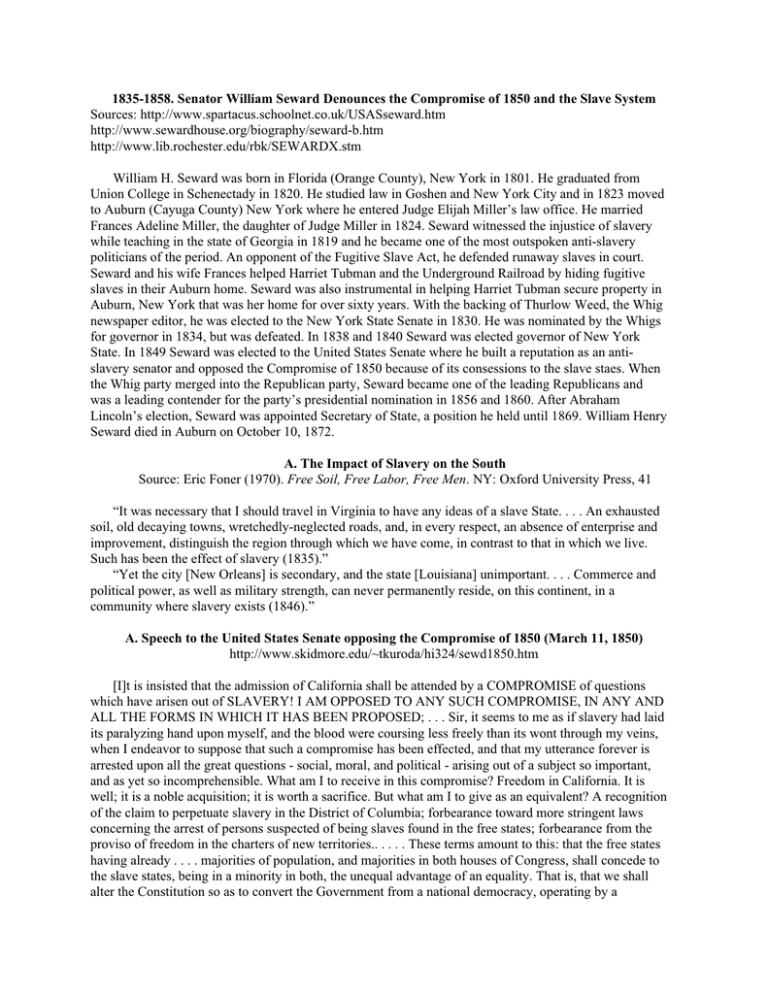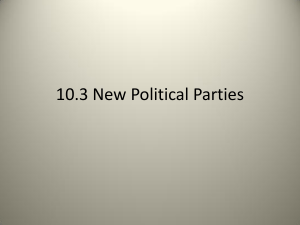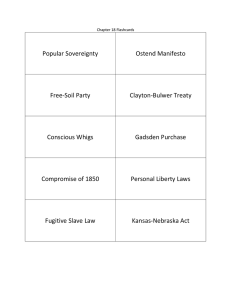William Seward: Speeches Against Slavery and Compromise (1850-1858)
advertisement

1835-1858. Senator William Seward Denounces the Compromise of 1850 and the Slave System Sources: http://www.spartacus.schoolnet.co.uk/USASseward.htm http://www.sewardhouse.org/biography/seward-b.htm http://www.lib.rochester.edu/rbk/SEWARDX.stm William H. Seward was born in Florida (Orange County), New York in 1801. He graduated from Union College in Schenectady in 1820. He studied law in Goshen and New York City and in 1823 moved to Auburn (Cayuga County) New York where he entered Judge Elijah Miller’s law office. He married Frances Adeline Miller, the daughter of Judge Miller in 1824. Seward witnessed the injustice of slavery while teaching in the state of Georgia in 1819 and he became one of the most outspoken anti-slavery politicians of the period. An opponent of the Fugitive Slave Act, he defended runaway slaves in court. Seward and his wife Frances helped Harriet Tubman and the Underground Railroad by hiding fugitive slaves in their Auburn home. Seward was also instrumental in helping Harriet Tubman secure property in Auburn, New York that was her home for over sixty years. With the backing of Thurlow Weed, the Whig newspaper editor, he was elected to the New York State Senate in 1830. He was nominated by the Whigs for governor in 1834, but was defeated. In 1838 and 1840 Seward was elected governor of New York State. In 1849 Seward was elected to the United States Senate where he built a reputation as an antislavery senator and opposed the Compromise of 1850 because of its consessions to the slave staes. When the Whig party merged into the Republican party, Seward became one of the leading Republicans and was a leading contender for the party’s presidential nomination in 1856 and 1860. After Abraham Lincoln’s election, Seward was appointed Secretary of State, a position he held until 1869. William Henry Seward died in Auburn on October 10, 1872. A. The Impact of Slavery on the South Source: Eric Foner (1970). Free Soil, Free Labor, Free Men. NY: Oxford University Press, 41 “It was necessary that I should travel in Virginia to have any ideas of a slave State. . . . An exhausted soil, old decaying towns, wretchedly-neglected roads, and, in every respect, an absence of enterprise and improvement, distinguish the region through which we have come, in contrast to that in which we live. Such has been the effect of slavery (1835).” “Yet the city [New Orleans] is secondary, and the state [Louisiana] unimportant. . . . Commerce and political power, as well as military strength, can never permanently reside, on this continent, in a community where slavery exists (1846).” A. Speech to the United States Senate opposing the Compromise of 1850 (March 11, 1850) http://www.skidmore.edu/~tkuroda/hi324/sewd1850.htm [I]t is insisted that the admission of California shall be attended by a COMPROMISE of questions which have arisen out of SLAVERY! I AM OPPOSED TO ANY SUCH COMPROMISE, IN ANY AND ALL THE FORMS IN WHICH IT HAS BEEN PROPOSED; . . . Sir, it seems to me as if slavery had laid its paralyzing hand upon myself, and the blood were coursing less freely than its wont through my veins, when I endeavor to suppose that such a compromise has been effected, and that my utterance forever is arrested upon all the great questions - social, moral, and political - arising out of a subject so important, and as yet so incomprehensible. What am I to receive in this compromise? Freedom in California. It is well; it is a noble acquisition; it is worth a sacrifice. But what am I to give as an equivalent? A recognition of the claim to perpetuate slavery in the District of Columbia; forbearance toward more stringent laws concerning the arrest of persons suspected of being slaves found in the free states; forbearance from the proviso of freedom in the charters of new territories.. . . . . These terms amount to this: that the free states having already . . . . majorities of population, and majorities in both houses of Congress, shall concede to the slave states, being in a minority in both, the unequal advantage of an equality. That is, that we shall alter the Constitution so as to convert the Government from a national democracy, operating by a constitutional majority of voices, into a federal alliance, in which the minority shall have a veto against the majority. And this would be nothing less than to return to the original Articles of Confederation. . . . . Relying on the perversion of the Constitution, which makes slaves mere chattels, the slave states have applied to them the principles of the criminal law, and have held that he who aided the escape of his fellow-man from bondage was guilty of a larceny in stealing him. . . . . We deem the principle of the law for the recapture of fugitives, . . . unjust, unconstitutional, and immoral; and thus, while patriotism withholds its approbation, the consciences of our people condemn it. . . . [T]he spirit of the people of the free states is set upon a spring that rises with the pressure put upon it. That spring, if pressed too hard, will give a recoil . . . You will say that this implies violence. Not at all. It implies only peaceful, lawful, constitutional, customary action. B. William Seward Denounces the Slave System, Rochester, New York (October 25, 1858) http://www.spartacus.schoolnet.co.uk/USASseward.htm The slave system is one of constant danger, distrust, suspicion, and watchfulness. It debases those whose toil alone can produce wealth and resources for defense to the lowest degree of which human nature is capable, to guard against mutiny and insurrection, and this wastes energies which otherwise might be employed in national development and aggrandizement. In states where the slave system prevails, the masters directly or indirectly secure all political power and constitute a ruling aristocracy. In states where the free-labor system prevails, universal suffrage necessarily obtains and the state inevitably becomes sooner or later a republic or democracy. The two systems are at once perceived to be incongruous - they are incompatible. They never have permanently existed together in one country, and they never can. Hitherto, the two systems have existed in different states, but side by side within the American Union. This has happened because the Union is a confederation of states. But in another aspect the United States constitute only one nation. Increase of population which is filling the states out to their very borders, together with a new and extended network of railroads and other avenues, and an internal commerce which daily becomes more intimate, is rapidly bringing the states into a higher and more perfect social unity of consolidation. Thus, these antagonistic systems are continually coming into closer contact, and collision results. The Democratic Party derived its strength originally from its adoption of the principles of equal and exact justice to all men. So long as it practised this principle faithfully, it was invulnerable. It became vulnerable when it renounced the principle, and since that time it has maintained itself not by virtue of its own strength, or even of its traditional merits, but because there as yet had appeared in the political field no other party that had the conscience and the courage to take up, and avow, and practice the life-inspiring principle which the Democratic Party surrendered. At last, the Republican Party had appeared. It avows now, as the Republican Party of 1800 did, in one word, its faith and its works, "Equal and exact justice to all men." The secret of its assured success lies in that very characteristic, which in the mouth of scoffers constitutes its great and lasting imbecility and reproach. It lies in the fact that it is a party of one idea; but that idea is a noble one - an idea that fills and expands all generous souls - the idea of equality - the equality of all men before human tribunals and human laws, as they are equal before the divine tribunal and divine laws.




